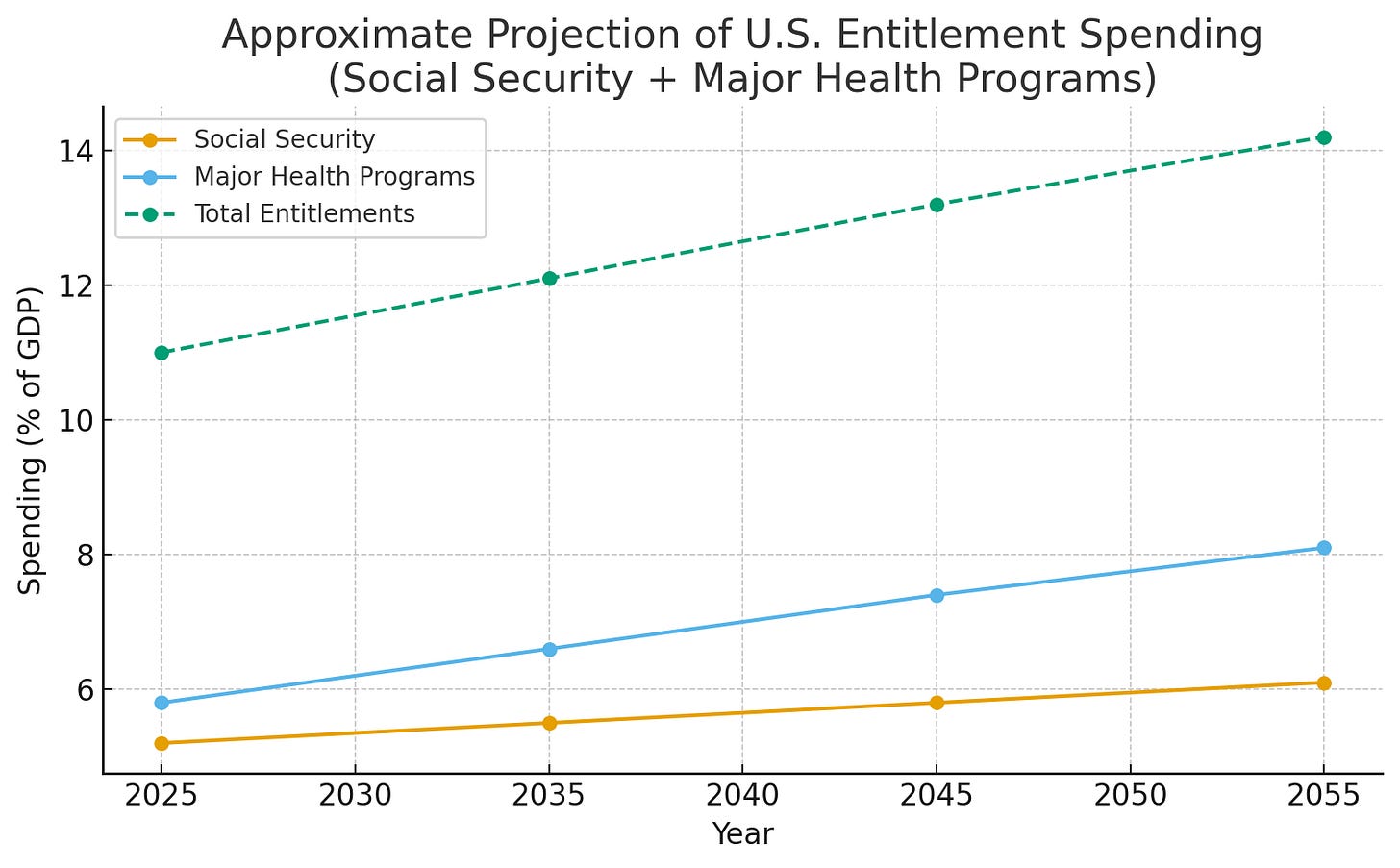Enchanted by Socialism
Democratic socialism is a patient form of socialism. Cronyism is now just called "capitalism." Our mixed economy makes it all confusing for young people. Let's break it down.
The Fabian Society was founded in 1884 in London as a socialist organization committed to gradual change rather than violent revolution. It has served as the primary think tank of Britain’s Labour Party, which means it’s steeped in so-called democratic socialism.
Their original logo is a wolf in sheep’s clothing.
The Fabian Society took its name from Roman general Quintus Fabius Maximus, known for wearing down enemies through patient, deliberate tactics rather than direct attacks. The name is meant to reflect the society’s commitment to gradualism. No violence. No gulags. No famines. Just slow “permeation.”
But a wolf is still a wolf. And socialism is still a predatory project.
The Enchantment
The false promises of socialism once again enchant a lot of young people. The term “democratic” adds a veneer of justification. And Fabian-style gradualism means slow rot instead of Jacobin zeal. Our institutions of learning have become de facto reeducation camps. In short, socialism is making a comeback. Most of its full-throated supporters were born after 1989, when the Berlin Wall fell and the Eastern Bloc liberated itself. Too few remember the economic malaise and poverty left by Britain’s nationalizations and Fabian socialist rule, which dominated the post-war era until Thatcher.
Elle Griffin, a popular Substacker and sci-fi author, argues we should all be more comfortable with the s-word.
If you look at any major media outlet today, you will see Zohran Mamdani and Bernie Sanders being called socialist. At their rallies you will see their followers calling themselves socialist. I have friends who call themselves socialist. This label is being used in a very mainstream way to describe this movement, despite the fact that the polices they are asking for are universal healthcare, universal childcare, etc. These are classic Nordic socialized welfare systems, not centralized government and Marx style socialism.
Now, if you look at any major media outlet today, you will also see those who oppose Zohran and Bernie calling these figures and their followers socialists. You will see mainstream media outlets branding the Nordic Countries “socialist.” When they use the word, they are using it as an diss, attributing these social welfare systems as the first step toward a Soviet hellscape to match the Soviet Union. Historically speaking, that’s what socialism was in its most classic ideation, and thus that’s what modern socialists want to create.
But people today are using the word in both ways. So we can stick to our guns and say “socialism is only the textbook version established in the mid 1850s and doesn’t exist anymore in the world.” Or we can also see that it’s being used different now to describe a different thing. What the movement has tried to brand “democratic socialism” as a separation from the historical term.
I mean no offense, but this desire to mainstream socialism by playing fast and loose with word meanings makes someone like Griffin either a sheep (useful idiot) or a wolf in sheep’s clothing. Either way, here’s the Motte and Bailey tack.
Let’s assume Griffin truly believes what she writes. And no doubt, being good at science fiction writing can make one vulnerable to visions of Shangri-La, where one has only to imagine an end state without fully considering the means to realize it. But even socialism’s gradualist forms have a sorry history.
As this woeful defense of socialism by Amie Boakye demonstrates, the wolves in the academy have trained a new army of sheep. As with Griffin’s defense, I can’t tell if Boakye’s article is sheer ignorance or deliberate dishonesty. But Griffin and Boakye are part of a new vanguard, which should trouble anyone who wants their children to inherit a prosperous society—not the detritus of a civilization left by socialism’s false promises.
Alexis de Tocqueville said it well:
Democracy and socialism have nothing in common but one word: equality. But notice the difference: while democracy seeks equality in liberty, socialism seeks equality in restraint and servitude.
We’re being generous to Tocqueville in terms of his construal of “democracy.”
But the new socialist vanguard doesn’t appreciate just how far down the road to serfdom we’ve already gone with our mixed economy.
Economist Sanford Ikeda writes that socialist planning requires suppressing “the petty plans and personal aspirations of mere individuals and the submission of personal values to those of the collective.” In other words, civilization dies one petty aspiration at a time. Ikeda continues,
The system may grind along this way for a while, but the temptation to abandon true democracy — by transferring decision-making authority to smaller groups of experts in each field, for example — becomes harder and harder to resist. In such circumstances, making swift, effective decisions becomes more desirable and less possible. The lofty goals of theoretical socialism — the international brotherhood of workers and global economic justice — tend to be swept aside by local concerns of hunger and security, opening the door to (nonproletarian) dictatorship.
Socialism’s nature is centralization.
Someone might reply that while such problems might apply to full-fledged socialism, the kind of democratic socialism that today’s intelligentsia advocate is far less extreme. If so, the question becomes this: In a mixed capitalist economy — regulatory-state, welfare-state, or crony capitalism — to what extent do these consequences emerge? How robust is the trade-off I’m describing?
Ikeda concludes that central planning and individual autonomy exist in fundamental tension: the more a government centrally plans the economy, the less it can tolerate individual dissent and deviation.
That’s just the nature of a government monopoly, not some fashionable new dialectic.
Socialists must therefore acknowledge hard truths and be prepared to swallow them. Compulsion is the bedrock of state power. Compulsion and self-direction are incompatible. As government planning replaces decentralized, private decision-making, individual autonomy diminishes while state authority expands. Thus, according to Ikeda, far from melding with it, socialism reduces democracy. Once central authorities seize monopoly control of any means of production, they will do everything in their power to keep it, whatever the demands of a plebiscite.
Notable Failures of Democratic Socialism
Sweden’s experiment with expansive democratic socialism in the 1970s and early 1980s brought the country to the brink of economic crisis. High marginal tax rates—reaching over 80 percent—combined with extensive government ownership and regulation, created severe disincentives for entrepreneurship and productive work. The economy stagnated, unemployment rose, and previously robust Swedish companies struggled under the weight of bureaucratic controls. By the early 1990s, Sweden faced a banking crisis and was forced to undertake significant market-oriented reforms. These included reducing tax rates, partially privatizing state enterprises, introducing school choice through voucher systems, and reforming the pension system with individual accounts. The reforms demonstrated that even the famed “Swedish model” required substantial infusions of market mechanisms to remain economically viable.
New Zealand’s democratic socialist policies of the 1970s and early 1980s produced one of the most dramatic economic declines in the developed world. Extensive price controls, import restrictions, agricultural subsidies, and a bloated public sector transformed what had once been one of the world’s wealthiest nations into an economic basket case. By 1984, the country faced a currency crisis and mounting debt. The subsequent Labour government, surprisingly, implemented free-market reforms known as “Rogernomics” (after Finance Minister Roger Douglas). These sweeping changes eliminated subsidies, floated the currency, reduced tariffs, privatized state assets, and deregulated vast sectors of the economy. While painful in the short term, these reforms restored New Zealand’s economic competitiveness. They demonstrated that even a country deeply committed to socialism could reverse course when faced with economic reality.
Britain’s post-war consensus around nationalization and welfare state expansion reached its nadir in the 1970s, culminating in the “Winter of Discontent” of 1978-79. Powerful trade unions, nationalized industries operating as inefficient monopolies, price controls, and high taxation produced stagflation, regular strikes, and national decline. Margaret Thatcher’s government, beginning in 1979, embarked on a comprehensive program of privatization, trade union reform, deregulation, and tax reduction. Key industries, including telecommunications, gas, electricity, water, and airways, were privatized, while council houses were sold to tenants. Though controversial, these Thatcherite reforms revitalized British industry, attracted foreign investment, and restored economic growth, proving that reversing decades of socialist policy was both possible and necessary.
Notice that all three failures of democratic socialism required liberalization, that is, de-nationalization, deregulation, and substantive tax reform. While all three are still mixed economies, there is little left of the so-called “Nordic” model of democratic socialism—at least in New Zealand and Sweden.
The Nordic Model and the US Entitlement State
Consider the evidence: Of the 184 countries ranked by level of economic freedom (i.e., not socialism), all the Nordic countries are in the top 20. (Source)
Notice which country did not make it to the top twenty: the United States.
Yet the democratic socialists constantly bang on about how the US needs to be more like the economically freer Nordic countries. Of course, almost no one mentions Britain as an exemplar of successful democratic socialism, because Britain’s return to malaise is evident to any honest observer. Based on the most current data, the UK’s economic indicators are most comparable to those of the poorest US states.
The United Kingdom’s nominal GDP per capita is now lower than that of every U.S. state, including the poorest. In 2020, Mississippi’s nominal GDP per capita was approximately $40,800, slightly below the UK’s $43,500. By 2024, Mississippi had risen to roughly $53,100 while the UK stood at $52,400, meaning the poorest U.S. state overtook the UK in nominal terms for the first time.
Over the more extended period (2000–2024), Mississippi’s real (inflation-adjusted) GDP per capita grew by about 36 percent, roughly matching the pace of many other U.S. states but exceeding the United Kingdom’s real per capita growth of approximately 25–27 percent over the same 24 years. When adjusted for purchasing-power parity and regional cost-of-living differences, living standards in Mississippi and the UK remain broadly comparable, with Mississippi holding a modest edge in recent years.
Words Have Meaning
In short, words have meaning. While it is true that market economies in the top twenty of economic freedom, like the United States, have expansive welfare states, they are not “socialist.” They have welfare programs and, compared to the US, tiny, inexpensive warfare states.
The democratic socialist might argue that authorities need to transfer funds out of our expansive warfare state to rescue our teetering welfare state. But even if we were to reduce federal defense spending by half, the existing US welfare state would still need to be cut back considerably to get us out of a $38T debt within, say, 50 years. In other words, even with a $425 billion annual defense cut, the structural growth in entitlement spending—driven by demographics and healthcare costs—plus interest on existing debt would require massive reductions in entitlements to achieve fiscal balance over 50 years. The exact percentage would depend on assumptions about GDP growth, inflation, and interest rates, which do not fare well under democratic socialism.
But the point is clear: defense cuts alone cannot solve the fiscal imbalance created by entitlement spending trajectories.
The democratic socialist arguments amount to this:
Wouldn’t it be awesome if, like, the government took billionaires’ wealth to provide Americans with more free stuff?
No. Even if the authorities taxed every single dime of the wealth of the top 1 percent of Americans—which includes liquidating all their assets—it would only pay for the federal government to run for less than 9 months.
Cronyism is the Problem
Many young people feel overwhelmed by how hard it has become to afford a decent standard of living in today’s America—and that feeling is entirely understandable. But matters are as bad or worse in Canada and the UK, which are far more democratic socialist by degree.
The core problem isn’t an excess of market dynamism or too many entrepreneurs chasing opportunity. It’s the crushing arithmetic of a political system that keeps compounding interest on ever-growing debt, inflating the currency to paper over grotesque levels of federal spending, NIMBY’s who refuse to let urban areas build more housing, and expanding programs that the next generation cannot possibly finance through increased taxation.
The US is nowhere close to being a free market; it’s an economy increasingly distorted by socialism on the front end (failing public schools, entitlements) and cronyism on the back end (healthcare and military)—expanding spheres of political allocation rather than voluntary exchange. I’ll pass over all the monetary malfeasance for now.
Young Americans aren’t struggling because markets have failed them, but instead because the parts of the economy most insulated from market discipline have grown so large that they now drag the rest of the system down.
More on socialism….
Useless Eaters
I’d never heard of EBT TikTok before last week. The term originated with a trend started by welfare recipients who, before the government shutdown, would flaunt their cartloads of EBT purchases or discuss ways to game the SNAP benefits system. Some sell their EBT cards for cash. Others buy fake nails or DoorDash. Such posts inflame the working poor, who feel they must work overtime to subsidize the profligacy of the idle while making ends meet.
An Open Letter to a Young Marxist
A candle loses nothing when it lights another candle. —Thomas Jefferson
Can We Have Welfare Without the Threat of Violence?
Practicing mutual aid is the surest means for giving each other and to all the greatest safety, the best guarantee of existence and progress, bodily, intellectual, and moral.












You make a very good case overall that civ is hard and needs a balance of opposites to thrive. Individual and Collective are the main opposites that need to jive and complement each other. Where the collective benefits the individual and vice versa.
Western Capitalism is eating itself alive at this point, and I mean that quite literally. It's just one extreme that needs to come back into balance with the other, or die.
The Fabian wolf in sheeps clothng is such a fitting symbol for gradualism. The data on Sweden and New Zealand reversng course with market reforms really undercuts the idea that you can sustain democratic socialism without eventual liberalzation. The math on entitlement spending makes the point pretty clear too.